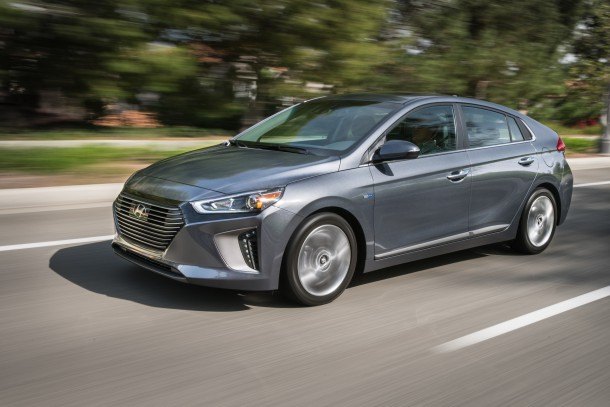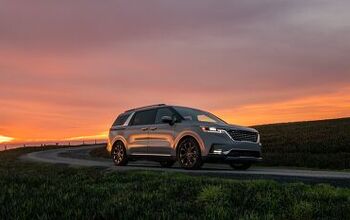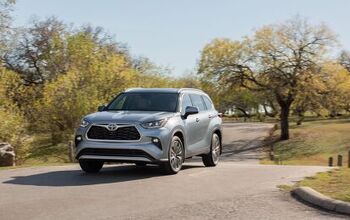2017 Hyundai Ioniq Hybrid's Price is the Latest Blow for Toyota's Prius

Once upon a time, Toyota’s Prius was the only real choice for anyone looking to get into a futuristic “hybrid” car. The microscopic Honda Insight, looking like a tear dropped from a poet’s eye, held two seats — and that’s no good for taking your friends to book club.
As technology did what it has been known to do (advance), other automakers picked up the torch, outfitting conventional family sedans with battery packs and Atkinson-cycle engines. The segment soon became more diverse, just in time to see the public’s enthusiasm for hybrids taper off.
Now, from Japan’s neighbor, comes a new Hyundai model — offered as a hybrid or electric, and with a plug-in on the way — that undercuts the world’s most recognizable hybrid in price. Your move, Toyota.
As models roll out to dealer lots, Hyundai has announced pricing for both the hybrid and all-electric variant of its Ioniq family, all of which ride atop a dedicated electrified platform.
Selling a straight-up hybrid vehicle these days is tough, as buyers are either choosing to forgo cars in favor of big SUVs and crossovers, or opt for a plug-in variant that offers a measure of all-electric range. Both the Prius and Ioniq have plug-in models on the way.
Unfortunately for Toyota, the Ioniq Hybrid arrives with a lower entry price — $22,200, plus a $835 delivery charge, in base Blue trim. A mid-range SEL trim retails for $23,950, still lower than the base Prius price of $24,685 (plus delivery). Only the Ionic Hybrid’s top Limited trim goes higher with an MSRP of $27,500.
Hyundai, always the value pick, scores again on that front. When you’re a newcomer in a small and competitive market that isn’t exactly on fire, it’s best to do something to stand out. The Ioniq’s powertrain, which features a direct-injection 1.6-liter Atkinson-cycle four-cylinder mated to a 43-horsepower electric motor, makes a combined power rating of 138 hp, to the Prius’ 121.
While the Prius offers a continuously variable transmission for smooth efficiency, Hyundai has gone a different route, preferring the engaged feel of a six-speed dual-clutch automatic. For efficiency, Hyundai’s setup delivers more — an EPA-estimated 58 miles per gallon in combined driving, versus the Prius’s average of 52 mpg. (The Eco version is rated at 56 mpg.)
Coefficient of drag for both models is identical, at 0.24 Cd.
While it would seem the Ionic Hybrid excels in many areas, its electric counterpart arrives at a time when long-range, lower-cost EVs are beginning to hit the market. With 124 miles of range on tap, the Ioniq beats older models like the Ford Focus Electric and Nissan Leaf and matches the upgraded Volkswagen e-Golf. However, it falls far behind the Chevrolet Bolt’s 238 miles and upcoming Tesla Model 3’s 215.
One thing it does have going for it is price. The base Ioniq Electric carries a $29,500 MSRP before delivery, and before a federal tax credit that would push its price $7,500 lower. The Bolt, on the other hand, works out to about $30,000 after the credit.
After a radical redesign failed to result in a surge of new or returning buyers, Toyota’s Prius can only sit and chew its nails.
[Image: Hyundai Motor America]

More by Steph Willems
Latest Car Reviews
Read moreLatest Product Reviews
Read moreRecent Comments
- Wolfwagen Pennsylvania - Two long straights, 1 medium straight, 1 super short straight and a bunch of curves all on one end
- Haze3 EV median weight is in the range of 4500-5500lbs, similar to the low end of full size pickup trucks and SUV's or typical mid-size PU's and SUV's. Obviously, EV Hummers and PU's are heavier but, on average, EV=PU or mid/full SUV is about right. EV's currently account for ~1% of the cars on the road. PU's account for 17% and SUV's count for over 40%. If we take out light SUV's, then call it 30% SUV or so. So, large-ish PU's and SUV's, together, account for ~50% of the US fleet vs 1% for EV's. As such, the fleet is ALREADY heavy. The problem is that EV's will be making the currently lighter 50% heavier, not that PU/SUV haven't already done most of the damage on avg mass.Sure, the issue is real but EV responsibility is not. If you want to get after heavies, that means getting after PU/SUV's (the current problem by 40-50x) first and foremost.
- Redapple2 Telluride over Acadian (sic-tip cap-canada). 1 better car. 2 60 % us/can content vs 39 THIRTY NINE for an "American" car. 3 no UAW labor. Smart people drive Tellurides. Not so smart for the GMC. Dont support the Evil GM Vampire.!
- Theflyersfan My dad had a 1998 C280 that was rock solid reliable until around 80,000 miles and then it wasn't. Corey might develop a slight right eyelid twitch right about now, but it started with a sunroof that leaked. And the water likely damaged some electric components because soon after the leaks developed, the sunroof stopped working. And then the electrical gremlins took hold. Displays that flickered at times, lights that sometimes decided illumination was for wimps so stayed home, and then the single wiper issue. That thing decided to eat motors. He loved that car but knew when to fold the hand. So he bought a lightly used, off lease E-class. Had that for less than two years before he was ready to leave it in South Philly, keys in the ignition, doors unlocked, and a "Take it please" sign on the windshield. He won't touch another Benz now.
- Detlump A lot of people buy SUVs because they're easier to get in and out of. After decades of longer, lower, wider it was refreshing to have easier ingress/egress offered by an SUV.Ironically, the ease of getting in and out of my Highlander is very similar to my 56 Cadillac.


































Comments
Join the conversation
Couple of things: "Both the Prius and Ioniq have plug-in models on the way." The Prius Prime has been out since December, but good luck finding one, as many dealerships are (wisely) selling them as order-only and not stocking any on the lots. The carbon fiber hatch that hindered early production isn't helping either. Regarding the Prius versus Ioniq: I bought a leftover '16 Prius full well knowing the Hyundai was imminent, mostly on the strength of our last three Toyotas all going well over 200k miles with minimal fuss. The Prius (Two model with the older NiMH battery) regularly gets over mpg without trying, which I expect to improve once we get off this awful winter gas and temperatures in the PNW warm back up. I'll believe the Ioniq's mpg figures after a year of Fuelly data.
Wow, Korean really want to beat Japanese in everything from electronic to cars to kpop vs jpop drama even if they come a bit later in the game. 80-90s Japanese made great midsize and compacts, then 10 years later Korean improved their midsize n compact, I only think cuz they hire a great designer. They did lie about the fuel economy few years ago. So no thanks fool me once shame on u fool me twice shame on me. I bought my 2nd gen 3 years ago for $2.9k it had 200k. It has 252k now not bad for a 2005. Still get 48-50mpg in NYC. Still drive good n low maintenance. Nothing rattle inside or outside. Typical Japanese made car. Why Korean go start selling hybrid now? Why don't they jump to long range electric? Even Toyota now put all her resources to catch up on long range electric car. Toyota tried to improve the hybrid very hard and they said it almost reached the maximum efficiency and here Korean claim they can do better with less experience in building hybrid car. I just don't buy it. Sorry I don't believe in new untested products. Unlike Toyota hybrids that have been in the market for so long they must have learn their mistake n improved it further. That's why Korean try to beat Japanese using the I sell u cheaper than them aka dumping. As long they win something.